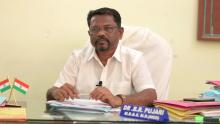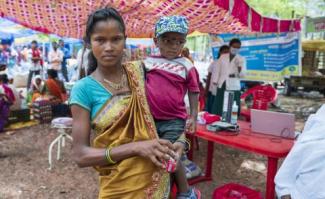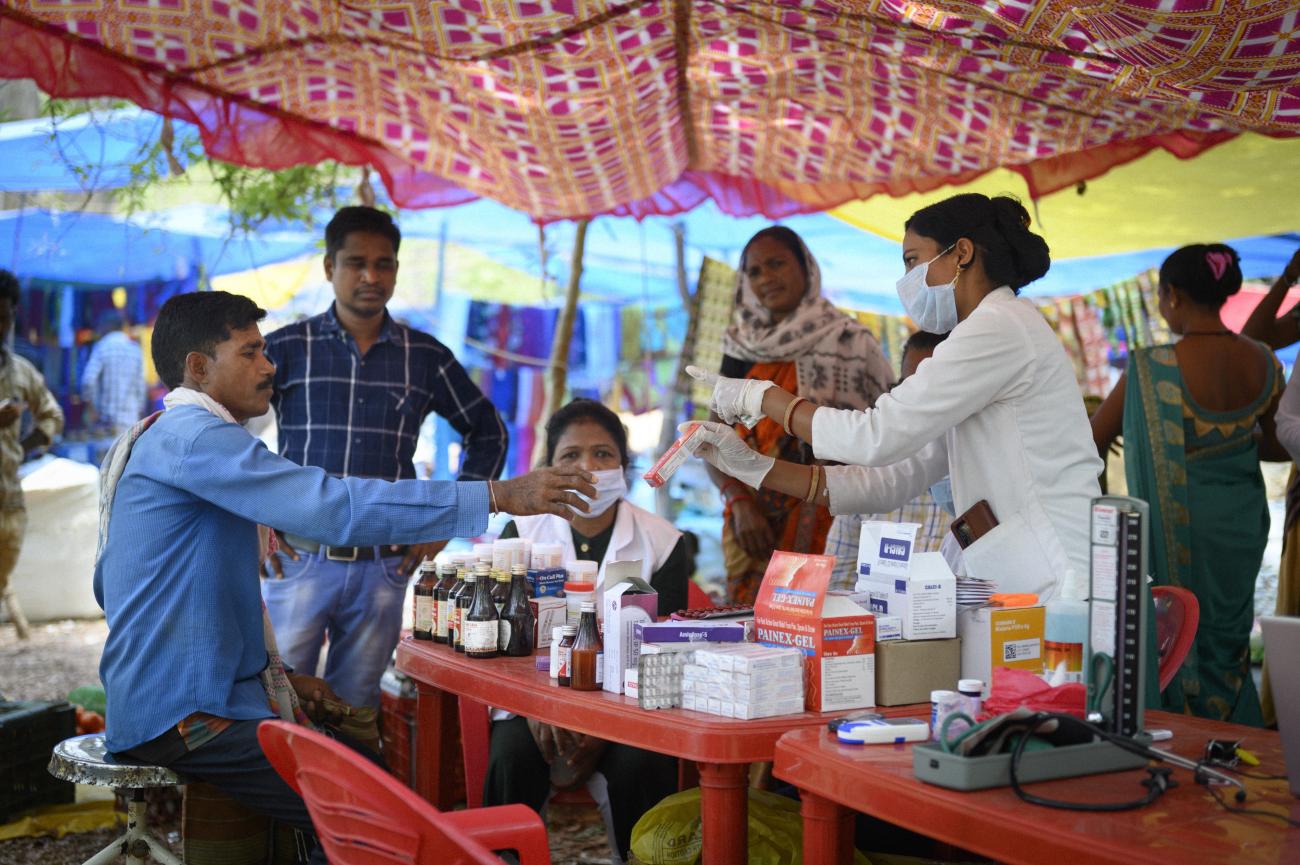The Chhattisgarh State Government launched the Mukhyamantri Haat Bazaar-Clinic Scheme in 2019 to allow people who visit community markets in remote rural areas to receive primary health care.
Tribal communities living in the forests of Chhattisgarh have limited access to healthcare services due to lack of social infrastructure and basic amenities like roads, health facilities, and running water.
Over 3 years, 95 291 people received health check-ups, and treatment where necessary. As of May 2022, a total of 1 888 clinics are now in operation covering a population of 18 million people.
WHO supported multiple stages of policy design and implementation for the initiative in co-ordination with the Government, providing technical assistance and evidence-based feedback for improvements.
A robust health system based on primary health care addresses almost all healthcare needs throughout our life course. The Mukhyamantri Haat Bazaar-Clinic Scheme provides primary health services to all at community markets to ensure that equitable, efficient, inclusive and cost-effective care reaches vulnerable populations. With such a comprehensive outreach, people-centred care for health promotion and disease prevention, diagnosis, treatment, and management serve as a programmatic engine for universal health coverage and accelerates progress towards health for all.

We encourage people coming to Haat Bazaar to get themselves checked at the health centre. We have made it compulsory for people coming from the interior area to get the malaria rapid diagnostic tests done irrespective of symptoms of fever. Through these tests, it has been diagnosed that 70% of the people are symptomatic malaria patients.
THE LONG READ
Mr Telamukta lives in Chichalgondi, a remote village in Chhattisgarh, India. He had never sought medical attention for his swollen legs and breathlessness because he was simply too far away to visit a health care centre. One day, he noticed something different in his local Haat Bazaar community market, to which he travelled weekly to get his family’s groceries. A mobile medical unit was offering check ups and treatment.
“On visiting this Haat Bazaar clinic, I was informed that I have diabetes and hypertension. Now I am feeling better after taking the medicines. Coming to this location has proven advantageous for me, as the doctors were able to identify the underlying issue of my condition. This is why I make regular visits here to get my medications,” said Mr Telamukta.
The weekly Haat Bazaars of Chhattisgarh are a traditional form of barter system for the tribal communities living in remote rural areas. People walk long distances to sell their forest or agricultural produce, buy household supplies, and assemble to exchange news and information.

The markets are fundamental for commerce and provide many opportunities for social and cultural exchange between different communities.
Primary health care where people need it most
The Chhattisgarh State Government saw these markets as a great opportunity to bring PHC services closer to the people who need it the most. In 2019, they launched the Mukhyamantri Haat Bazaar-Clinic Scheme. Today, hundreds of clinics operate in markets across Chhattisgarh, serving a population of 18 million, many of whom have never had access to healthcare before.
“For the past two years, I have operated the Mukyamantri Haat Bazaar Clinic. People from the interior areas, especially those who live far away, visit the Haat Bazaar every week and come here. If they have any health problems we do a complete lab diagnostic test, give them medicines, and also tell them if this medicine is not benefiting, you can visit us again at the next Haat Bazaar,” said Dr Thomas Damor, Medical Officer, Community Health Centre, Chhindarh.
Medical teams who operate the clinics include doctors, community health officers or mid-level healthcare workers, pharmacists, nurses, and drivers. The clinic provides maternal and newborn care, immunization, treatment for common illnesses such as fever, scabies, cold, cough, diarrhoea, malaria, anaemia, and screening for noncommunicable diseases such as diabetes, hypertension, and cancers.

When possible, patients can receive medications here or be referred to secondary or tertiary care. Mitanins are community-level frontline health workers who make home visits in the assigned areas and inform communities about the next scheduled Haat Bazaar Clinic and the services available. The mid-level healthcare workers, along with the Mitanins, also play a vital role in mobilizing pregnant women for antenatal care, and children for vaccinations.
Free and easily accessible health services for everyone
All services and treatment are provided free of charge. The health services are convenient, effective, and affordable to all. This means greater equity in access, and firmly places primary health care as the foundation of a stronger health system overall. This is a big step towards achieving universal health coverage (UHC), where everyone can access the health services they need without experiencing financial difficulty.
The convenient location also means that community members face fewer barriers to accessing health care, such as entering a hospital building. The Government also uses the mobile clinics as a platform to create awareness of health and well-being in the community. Testing at primary care level is a way to identify problems early on and prevent serious cases of ill health and disease developing among the population.
“Every week, we visit the market to purchase essential household items, and as an added benefit, we also visit the Haat Bazaar clinic to get ourselves treated. I am suffering from backache and knee pain. Doctors did my checkup and gave me medicine for weakness, backache, and knee pain. After this, I plan to complete some shopping before going back home,” said Sushila Micha, a 50-year-old resident of Cheramangi village, Bijapur district who was attending Usoor Haat Bazaar clinic.
The work of Haat Bazaar Clinics at primary care level is intricately linked to regular health system functioning, including coordination and synergy with hospitals and other specialized care. “A robust health system based on primary health care addresses almost all healthcare needs throughout our life course.

The Mukhyamantri Haat Bazaar-Clinic Scheme provides primary health services to all at community markets to ensure that equitable, efficient, inclusive and cost-effective care reaches vulnerable populations. With such a comprehensive outreach, people-centred care for health promotion and disease prevention, diagnosis, treatment, and management serve as a programmatic engine for universal health coverage and accelerates progress towards health for all,” said Dr Roderico Ofrin, WHO Representative in India. For example, malnourished children are referred to a nutrition centre, and more serious cases of heart disease are referred to hospitals.
Positive impact on health in communities
From 2019 when the work started, more than 95 000 people have received check-ups and treatment where necessary.
“I have come to the market to buy groceries. I am nine months pregnant. Doctors from this health centre conducted a blood test and gave me medicines. I have received the treatment and now will go back home,” said Lekham Jamli, 22, a young mother at Aavapalli Haat Bazaar.
As of March 2022, 2.5 million outpatient department patients received consultations in 1 497 Haat Bazaar Clinics. Recently, 145 new clinics were added covering 350 000 people, and as of May 2022, a total of 1 888 clinics are now in operation, covering a population of 18 million people.
"Through these tests, it has been diagnosed that 70% of the people are symptomatic malaria patients,” said Dr B R Pujari, Chief Medical and Health Officer, Narayankpur District.

WHO promotes primary health care for all
With support from the UHC Partnership, WHO has been involved at multiple stages of policy design and implementation for the Mukhyamantri Haat Bazar Clinics in coordination with the Government of India. WHO provide technical support in coordination with health authorities in three districts to roll out the clinics, analysed the impact of the work on service delivery, and fed back findings to improve the initiative’s design and implementation.
The UHC Partnership brings WHO’s expertise to over 125 countries, with the aim of accelerating progress towards UHC. This is made possible by funding from the European Union, the Grand Duchy of Luxembourg, Irish Aid, the French Ministry for Europe and Foreign Affairs, the Government of Japan - Ministry of Health, Labour and Welfare, the United Kingdom - Foreign, Commonwealth & Development Office, Belgium, Canada and Germany.
